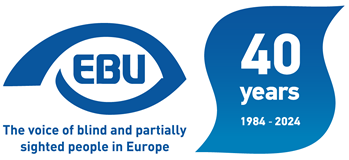No hay resultados
1. Convention Text
States Parties shall take, in accordance with their obligations under international law, including international humanitarian law and international human rights law, all necessary measures to ensure the protection and safety of persons with disabilities in situations of risk, including situations of armed conflict, humanitarian emergencies and the occurrence of natural disasters. R1
2. Declaration of Needs and Characteristics
2.1 In situations of risk, such as armed conflict, humanitarian emergencies and natural disasters, blind and partially-sighted people, especially women and children, are in a particularly vulnerable position.
2.2 The inability to see the environment makes it extremely difficult and often impossible for blind and partially-sighted people to orientate themselves to their surroundings, to assess their situation, to identify a place of safety or sources of food, water and shelter. Blind and partially-sighted people, especially women, children, and those with additional disabilities, are also very vulnerable to assault and theft in situations where such attacks may substantially reduce the prospects of survival.
2.3 Blind and partially-sighted people often rely to a considerable extent on the use of equipment such as canes or visual aids to obtain information from their immediate environment. Loss of such basic equipment can make an individual totally dependent on personal assistance from a third party in circumstances where such assistance may not be available or may not be dependable.
2.4 Blind and partially-sighted people require specific tools to communicate in writing. Braille writing equipment or handwriting frames may well have been lost or damaged. In consequence, blind and partially-sighted people are unable to communicate with their friends or family, or those specialist agencies that would be able to provide them with essential tools or equipment, or take action to ensure they receive other special services or assistance.
2.5 Agencies responsible for resettlement and repatriation must identify and keep records of blind and partially sighted people, have a full appreciation of their special communication, information, orientation, mobility and equipment requirements and have the capability to ensure their resettlement and repatriation requirements are met. Under no circumstances should the entitlement of blind and partially-sighted people to receive such assistance be deferred or refused on the grounds that the facilities or expertise required to provide assistance are not available. Such action or inaction constitutes discrimination, as defined in this convention.
3. Important Aspects of Convention Text
3.1 Convention text - R1 States Parties shall take, in accordance with their obligations under international law, including international humanitarian law and international human rights law, all necessary measures to ensure the protection and safety of persons with disabilities in situations of risk, including situations of armed conflict, humanitarian emergencies and the occurrence of natural disasters.
3.2 Requirement - Blind and partially sighted people must:
- receive assistance to a place of safety where they will be personally secure and free from physical harm;
- be provided with information on factors that may create or enhance levels of personal risk;
- be provided with the information needed to remain in a safe situation;
- be provided with access and know how to obtain clean water, food, clothing, shelter and medical support;
- receive any necessary assistance to communicate, receive and impart information or access to essential facilities;
- be provided with the support they require to move from one place to another as directed by responsible authorities;
- be provided with essential tools and equipment in relation to their visual loss - such as a white cane or correcting spectacles;
- receive any necessary assistance to contact their families;
- receive equal access to resettlement programmes and resources;
- receive help to get in touch with agencies that have the capability to give specialist assistance and support to blind and partially-sighted people.
3.3 Requirement - Agencies' staff responsible for the management and provision of assistance to people involved in humanitarian emergencies and situations of risk must receive training to ensure they have an appreciation of the requirements of blind and partially sighted people and how these can be met and to obtain the skills needed to offer personal assistance.

